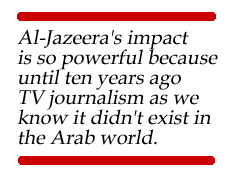Why is Al-Jazeera, the satellite television channel transmitting from Qatar—a small, relatively obscure Gulf Emirate—so popular, so powerful that it is starting to change the face of Arab TV news broadcasting?
Al-Jazeera's impact is so powerful because until ten years ago TV journalism as we know it did not exist in the Arab world; because free-ranging public affairs interview and talk shows with viewer participation via telephone did not exist in the Arab world.
In 1975-76 I spent most of my time in Beirut covering the Lebanese civil war as an NBC producer/reporter and acting Beirut bureau chief. It was the biggest story in the Arab world; nothing else much was happening in the region. Yet aside from the Lebanese themselves, not a single Arab national (the euphemism for state owned and directed) channel sent reporters, producers, or camera crews to cover the war. Why bother? TV was the most tightly policed of all media. In many Arab countries the minister of information made his offices in the same building that housed the national channel or channels and the news bulletins existed to a greater or lesser degree to glorify the leadership, be they left wing or right wing, socialist or monarchist.
The reasons for this tight control were several. In authoritarian countries with high rates of illiteracy, television (and radio) is a particularly dangerous medium. Unlike Arab newspapers, which were privately owned in politically moderate Arab states or had a history of private ownership prior to nationalization in the Arab socialist republics, TV channels were state-established from the beginning. They had no sense of mission beyond serving the state in the field of "information" as well as providing popular entertainment.
One other critical factor. Even the journalists and editors in the state-owned newspapers generally had access to newspapers from Paris, London, New York. The Arab print journalists knew by example what the international standards of journalism were, even if they could only hope to barely approximate those standards in those days in their own work. But television in the age before satellites was the most provincial of media, with transmission ranges of 50 miles. The typical Arab broadcaster could not learn by comparison. BBC Radio had a great impact precisely because it was accessible; BBC television was not.
The idea of journalists and in particular of TV journalists exercising their judgment as to newsworthiness was inconceivable. Whatever the head of state did was the lead item of the day—even if intrinsically un-newsworthy—followed by routine activities of his ministers. The ruler and his ministers held "important meetings" (pictures of the cabinet) or had frank or friendly discussions with visiting envoys (handshakes and shared cups of coffee) but rarely did the leading stories contain content.
Since it was the partisan position taken, not the newsworthy event itself, that mattered, the channels made use of global news agency footage (while complaining at UNESCO conferences about the Western monopoly of global news dissemination) while the news bulletin presenters read remotely connected copy from the state news agency that reflected the position taken on an given pan-Arab event. To put it another way: since it was the partisan position taken and not newsworthiness that mattered, why bother covering an event in any but the most token sense of a cameraman recording official formalities for domestic news, or the channel using TV news agency pictures for pan-Arab stories like the Lebanese civil war. Why bother with TV reporters? Indeed no one did. Why bother sending a cameraman to take pictures of the Lebanese civil war—if it was pictures and not coverage or understanding that was sought, then why go to the expense when far cheaper agency footage was available. And why worry about losing your audience when only the state had a tightly exercised monopoly on broadcasting and there were no satellite TV channels (Arab or non-Arab) to provide external competition?
When I served in Cairo as NBC News bureau chief from the mid-seventies to the mid-eighties, and I needed some public visibility to help get a scarce extra overseas phone line installed in the bureau or an interview with a minister, I would take my crew out to cover a public event where President Sadat (who had lifted censorship or restriction of movement for the foreign press corps in Egypt in 1974) would be present, even though the event was of no interest to NBC. Mike in hand, I would ask the president a question or two. The Egyptian TV cameramen covering the president's every public movement had no reporters of their own, so they would jump at the opportunity shoot my "interview" sequence. That evening and the following morning I would appear prominently on the local TV news bulletins. Since there were no satellite channels around offering alternative fare, everybody—including the recalcitrant minister or the uncooperative telephone and telegraph official—would see me with the president and respond to my requests respectfully.
What changed everything was CNN. In America CNN established itself as the channel for round-the-clock news coverage of dramatic events with its live coverage from Saudi Arabia and Baghdad during the buildup and on into the fighting of Desert Storm. And since satellite dishes were beginning to appear in Saudi Arabia and Egypt, and CNN had recently begun transmitting its signal internationally on a powerful satellite that reached the Arab world, suddenly CNN offered an alternative form of news coverage which large numbers of Saudis and Egyptians were now exposed to, as both countries began to rebroadcast CNN on spare transmitters as the conflict intensified. So CNN, in the Arab world, became a model for imitation—not by the bureaucratic and routine-driven national channels (except in the cosmetic sense of spiffing up the studio sets for the news bulletins and picking up the pace), but by a new privately owned channel, MBC, established in London by Saudi businessmen with close relations to the Saudi royal family.
Since MBC was established to compete for advertising with the Arab national channels, it sought superior production values—and that included doing real TV journalism, covering stories in the Arab world with correspondents directing camera crews and writing scripts for their own finished news reports. MBC was a great success in the early 1990s among those who owned dishes, but that was a far smaller number than those owning them today. When MBC was retransmitted terrestrially (no satellite, no dish, just an ordinary antenna) from Bahrain, an island barely a stone's throw from eastern Saudi Arabia, MBC's market share, especially during the news bulletins, was greater than the Saudi national channel in the eastern provinces. At the same time MBC gave the Saudi and allied Arab political establishment a wide berth in its news coverage without the embarrassing syncopy of the national channels, so MBC's compromises didn't seem in comparison so terribly compromising.
Orbit, another private satellite Arabic language operation also with close ties to the Saudi ruling family but a rival to MBC, started up in Rome a few years later but as multi-channel network with one channel produced by the BBC and known as BBC Arabic News but paid for by Orbit. This new channel provided true news stories, informed professional reports from the field. Orbit also introduced freewheeling talk shows in which guests of widely varying and often radical political persuasions engaged in fierce debate. Many of these guests, whether left wing nationalists and socialists or right wing Muslim fundamentalists, were generally excluded from single party or single family Arab authoritarian political life, so these programs became widely popular. BBC Arabic News collapsed in little more than a year because of a quarrel over editorial control between the Saudi owners of Orbit and the BBC, but the lively talk shows continued on other Orbit channels.
 Arab Media & Society The Arab Media Hub
Arab Media & Society The Arab Media Hub




